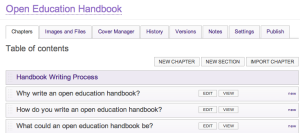Quick Wins with the Open Education Handbook
If you missed our two Open Education Handbook booksprints (in London and in Berlin) but you’d really like to contribute to the handbook then here’s how! We have split the following ideas up in to activities for different time periods to help you get started.
If you have 5 minutes…
Take a look at what we have so far. All the content is currently in the form of questions. Is there anything that you’d like answered but isn’t currently listed? Jot down ideas in an email and send it over to us (education [at] okfn.org).
If you have 10 minutes…
Take a look at what we have so far. Who is the audience for the handbook? How can it be delivered? Think about the mini-handbooks within this handbook e.g. How to create an OER in 10 steps, a guide on the benefits of open data for open education etc. Jot down ideas in an email and send it over to us (education [at] okfn.org).
If you have 20 minutes…
Set up a booktype account. Browse the content available and see if you can build on the answers to any of the questions already there. If you see a gap then add a question as a new chapter and write the answer. If you are struggling then consider the following questions which currently have no answers:
- Who is meant to benefit from open education?
- Is traditional education not open?
- Does creating OERs mean giving up ownership?
If you have 30 minutes or more…
Set up a booktype account. Browse the content available and pick a question that you are interested in. Consider the following points:
- Would it be useful to list an audience for this question? You could add it at the top of the question e.g. “Audience: This question is specifically for those who wish to create OERs, e.g. Institutions, educators etc.”
- Is the answer complete, can it be elaborated on?
- Are the resources and further links listed relevant? Are they valid? Can any more be added?
- Is the answer biased in some way? Could you add another angle to the discussion?
Are they any other points we need to consider to ensure that the answers are objective, appropriate and helpful?
Remember to add your name to the acknowledgements section.
Thanks for all your contributions
 Open Education Working Group
Open Education Working Group 




Leave a Reply